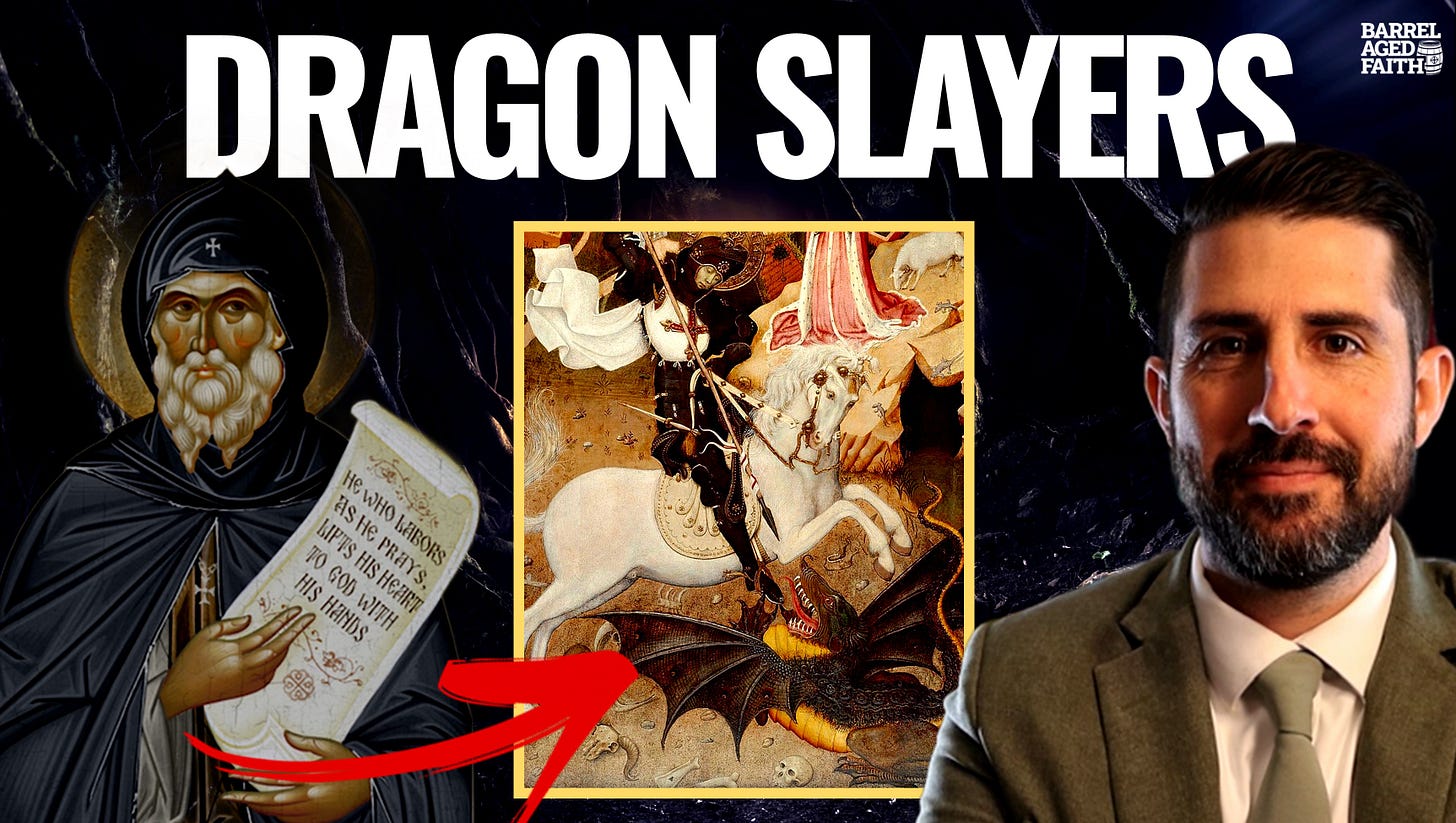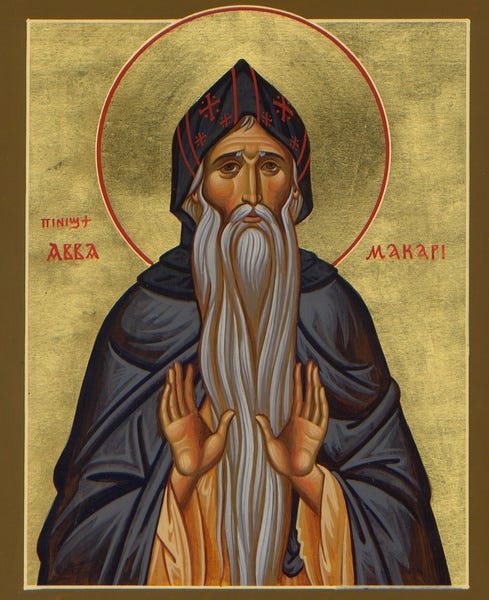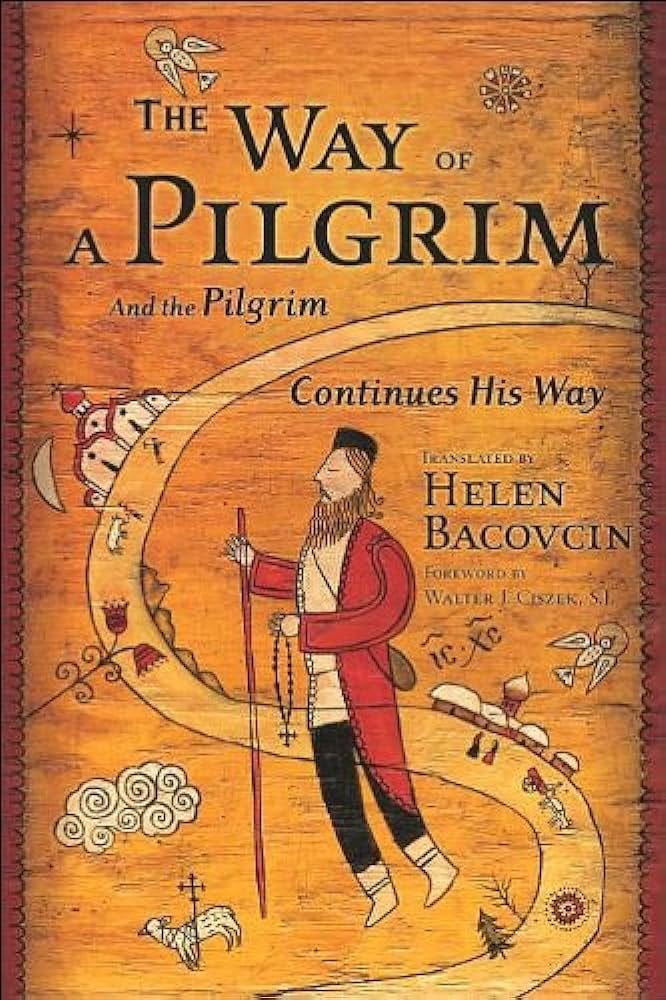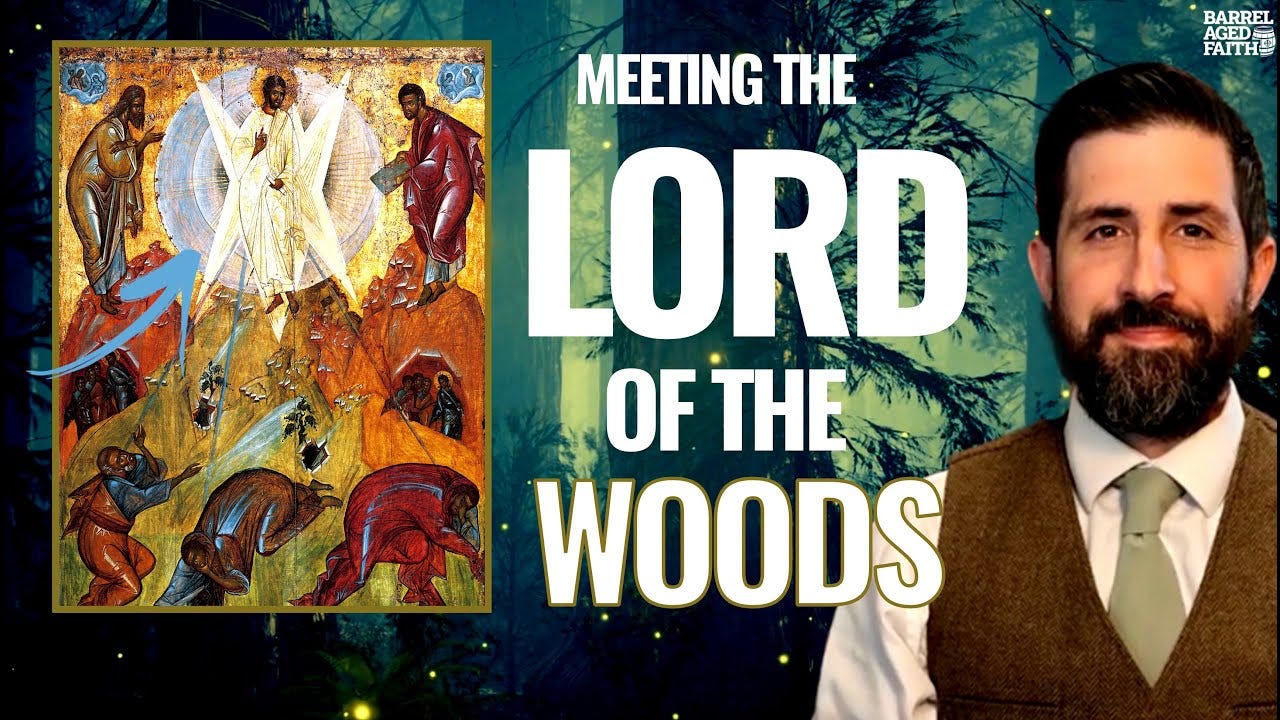Slaying the Dragons of the Heart
St. George Day (April 23rd) & The Ascent of the Soul (The 3 Fold Way)

Every April 23rd, Christians around the world celebrate and honor the life of St. George the Martyr.1 In England, it is known as St. George Day, and he is their patron saint. His own story of martyrdom is filled with miracles that brought many people to faith right before Christianity was legalized in the Roman empire. Here is a short summary from an Orthodox priest:
“He is buried in Lydda, Palestine, where Orthodox Christian Arabs live to this day (though sadly very few). Lydda was the homeland of St. George’s mother, and it is where he was raised after his father was martyred for Christ in Cappadocia. While St. George never spoke Arabic—because he lived before Islam and the expansion of the language—the Arabic-speaking descendants of his kinspeople in Palestine (and in Lebanon and Syria) greatly revere their “local” saint. For this reason, numerous Antiochian Orthodox churches are named after St. George… St. George was a member of Emperor Diocletian’s imperial guard, an honor he received due to his valor in war. However he proved to be far more brave and valiant in his witness to Christ. He is called a “great martyr” because so many people were converted by witnessing his martyrdom. Through his patient endurance of numerous tortures, 630 people who were converted to Christ, all of whom then became martyrs. Even the Roman emperor’s wife, St. Alexandra of Rome, was converted and then martyred. The icon depicts scenes from St. George’s martyrdom.”2
He is also known for slaying a dragon or sea serpent, which is why so many young boys love St. George. Who wouldn’t want to carry a sword and go dragon hunting?! Now this article isn’t a History Channel episode on whether dragons existed in ancient times or not, but rather, where they can still be found today…
The Dragons of the Heart
Dragons still lurk and lie within us, and these are the more deadly beasts, because they can drag us down to Sheol (the Grave; Hades; Hell). The desert father, St. Marcious of Egypt, summarizes this well:
“Within the heart are unfathomable depths. The heart itself is only a small vessel, yet dragons are there, and lions, there are poisonous beasts, and all the treasures of evil, there are rough and uneven roads, there are precipes; but there too is God and the angels, life is there, and the Kingdom, there too is light, and there the apostles and heavenly cities, and treasures of grace. All things lie within that little space.”3
St. Marcious’ description reminds me of a C.S. Lewis quote from Mere Christianity:
“It comes the very moment you wake up each morning. All your wishes and hopes for the day rush at you like wild animals. And the first job each morning consists simply in shoving them all back; in listening to that other voice, taking that other point of view, letting that other, larger, stronger, quieter life come flowing in. And so on, all day. Standing back from all your natural fussings and frettings; coming in out of the wind.” (Book 4, ch. 8)
Since there is a great battle going on in our hearts every single day, the apostles and desert fathers encourage us to develop the discipline of watchfulness. We must become like the Cherubim who are guarding the Eden of our hearts rather than the old Adam who fell asleep and allowed the dragon to sneak in. In comic book imagery, we must become like Batman who is guarding Gotham from criminals with great vigilance!

But how do we do this practically? It is so easy to succumb to the distractions of our devices and busy schedules. Before we can look at the world ‘practically,’ the eyes of our heart must be mystically awoken by Christ. So often, our minds (nous) are darkened and our spiritual vision is blurred or completely blind. We must turn to the 3 fold way that we find in Scripture and the fathers in order to seek insight.
How Do We Defeat the Dragon? The 3 Fold Way!
In the 3rd and 4th centuries, St. Anthony the Great and many other Christians left the city and spent a great deal of time with the Lord in the wilderness. These men and women became the first psychologists of the ancient world, the Desert Fathers and Desert Mothers. One of them, Evagrios of Pontus, recorded and cultivated the 3 fold way of spiritual formation.
[Please keep in mind that all three of these stages require the grace of God and His power (energies; activities), and that no person can ascend through these stages on their own. St. Paul speaks in a very similar manner: “He is the one we proclaim, admonishing and teaching everyone with all wisdom, so that we may present everyone fully mature in Christ. To this end I strenuously contend with all the energy Christ so powerfully works in me.” (Colossians 1:28-29).]
The Way of Purification (catharsis in Greek)4 The beginning of the Christian life involves the forgiveness of God through the waters of baptism and later, in the rite of repentance or confession. Although God graciously forgives us of our offenses and guilt before Him, dragons can still lurk in the crevices of our heart, because they represent our attachment to sin and our love of selfishness and vice. This is why Evagrios calls this first stage, Praktiki.5 We need to ‘practice’ virtue and be purified or ‘purged’ of vice. In the Christian West, this first stage was referred to as ‘The Purgative Way.’
In Scripture, we can see how vices such as anger and jealousy can lead to the descent of the soul. Genesis chapter 4 states, “Cain was very angry, and his countenance fell. 6 The Lord said to Cain, ‘Why are you angry, and why has your countenance fallen? 7 If you do well, will you not be accepted? And if you do not do well, sin is lurking at the door; its desire is for you, but you must master it.” Cain did not take the Lord’s advice in being vigilant against sin, and he was overwhelmed by it which led to the murder of his brother.
The first stage is to avoid being Cain. Instead, we are to become the master over our desires through grace. Temptations to sin will still come, but the watchful and vigilant man will guard his heart and overcome them. Ascetical practices such as fasting from food and pleasures are key to this stage. In other words, if one can show self-control with good pleasures, then one will be able to master and ultimately defeat their own sinful pleasures.
The Way of Illumination (fotisis in Greek). Evagrios calls this second stage, Physiki. It is a time to contemplate God and be filled with His wisdom. In the Christian West, this was referred to as ‘The Illuminative Way.’ The goal of this stage is to empty ourselves of worldly ‘wisdom’ as well as earthly cares and be filled with godly wisdom and trust. Imagine being like Mary (sister of Martha and Lazarus) who sat like a little child at the feet of our Lord as he enlightens and teaches her. Mary receives His love and grace freely while Martha is filled with the worries and expectations of this world.
In relation to spiritual warfare, this stage involves a person not only defeating their own dragons but also being trained to defeat others’ dragons. This is why it is so important for mothers and fathers as well as grandparents to reach this stage of spiritual maturity so that they can equip their children to fight their own dragons. St. John Chrysostom writes, “Let thy home be a sort of arena, a stadium of exercise for virtue. That having trained thyself well there, thou mayest with skill encounter all abroad.”6 When parents have not progressed in the first or second stages of the spiritual life, the home is greatly burdened with many temptations, anxieties and sins. Before anything else (sports, work, academia, entertainment), the home is to be a mini-monastery or mini-parish for Christian discipleship.
The Way of Union (theosis in Greek) Evagrios calls this third stage, Theologia, and it is where we get the word, ‘theologian.’ Evagrios writes, “A theologian is one who prays, and one who prays is a theologian.” Sadly, the modern West thinks of theologians as the top experts and academic researchers in the field of theology. One could almost be an atheist and still be a theologian if they simply know a lot about a given topic. The Christian East, on the other hand, has retained the original meaning and refers only to holy men and women who know and love God as theologians. The Christian West refers to this final stage as ‘The Unitive Way.’ The heart of this final stage is theosis whereby we become sharers in God’s presence through prayer and become melted into Him if you will.
It is important to clarify that all three stages are intertwined with one another to a certain degree. Illumination and theosis is beginning to occur in the first stage of purification particularly through the sacraments, but as Christians mature, they advance past the 1st stage and begin to sink their roots deeper and deeper into the 2nd and 3rd stages. A key sign of this progress is entering into ceaseless prayer with God and the fruit of the Holy Spirit pouring forth…
“The fruit of the Spirit is love, joy, peace, patience, kindness, generosity, faithfulness, gentleness, and self-control. There is no law against such things. And those who belong to Christ Jesus have crucified the flesh with its passions and desires. If we live by the Spirit, let us also be guided by the Spirit” (Galatians 5:22-24).
The classic yet simply Russian novel, The Way of the Pilgrim, demonstrates this reality.
We also see the apostles passing through this 3 fold way in the Gospels and Book of Acts.
First Stage (Purification): The apostles follow Christ and are baptized into Him. They become His apprentices or disciples by embracing the ‘disciplined’ way of their Master. They still struggle with doubt as well as vices such as anger and jealousy, yet they are still committed to Christ’s purifying work in their lives.
Second Stage (Illumination): The apostles are illumined with the wisdom of Christ particularly after His Resurrection. For 40 days, they sit at His feet no longer doubting like they once did before His passion and crucifixion.
Third Stage (Theosis or Union): The apostles are filled with the Holy Spirit in the Upper Room and experience His unceasing Presence. When people see St. Peter, they see Jesus. There are times when even Peter’s shadow heals others. In the second half of the Book of Acts, we see St. Paul doing the same things as St. Peter which all flow from the work of the Holy Spirit in their lives. The martyrdom of the Apostles is the finale of this unitive way, because they become entirely conformed to Christ’s own death. As St. Paul writes, “It is no longer I who live, but it is Christ who lives in me” (Galatians 2:20).
As we conclude, let us ask St. George the Great Martyr to pray for us as we seek to defeat the dragons of our hearts that threaten our homes, churches, and world so that Christ might make them into a living paradise of His Presence and peace.
“When you endured many methods of torture, you, O Martyr, were refined like gold in fire seven times over and purified.” (Hymn from Vespers for St. George)
Be entirely His,
Kyle
(Here is a little inspiration from Patristix on the Feast of St. George.)
In case you missed my last article on how prayer saved my life 2 decades when I was feeling intellectually overwhelmed, here is a short video going through it: https://youtube.com/live/N00n25ahVbY
[If the feast falls during Lent, Orthodox Churches generally transfer the commemoration of the Great Martyr George to Bright Monday or ‘Easter Monday.’]
*Homily 43 in The Fifty Spiritual Homilies and the Great Letter by Pseudo-Macarius, tr. George A. Maloney, S.J. (New York: Paulist Press, 1992), 219-222. Available for purchase from Eighth Day Books. See full homily here: https://www.eighthdayinstitute.org/the-heart-is-but-a-small-vessel
https://saintandrewgoc.org/blog/2012/5/16/the-threefold-way.html
https://orthodoxmeditations.blogspot.com/2016/01/the-threefold-path-of-ascent-to-god.html
https://core.ac.uk/download/pdf/108449.pdf








Kyle, this was an excellent article. Thank you!
Good stuff Kyle, thank you.